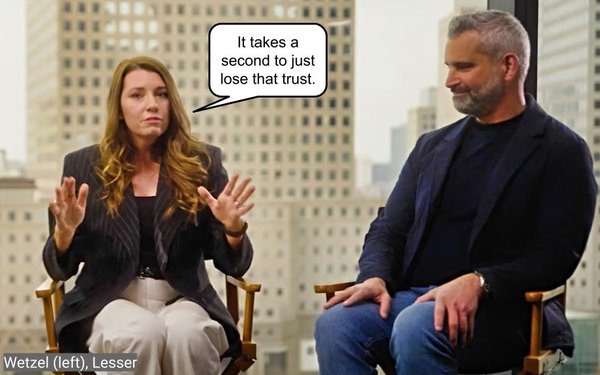
Addendum:
Following publication of this column Thursday, a WPP spokesperson issued a
statement saying the holding company was aware of Lesser's potential conflict of interest in the acquisition of InfoSum and evaluated it independently.
One of the best quotes I
ever published was one former GroupM CEO Irwin Gotlieb said about transparency in the advertising and media-buying business during a 4As conference in 2013.
"It doesn't say in Genesis that
everything has to be fully disclosed," Gotlieb said, inspiring my "Irwin Gotlieb
And The Fine Art Of Being Transparently Non-Transparent" back then.
advertisement
advertisement
Twelve years later, Gotlieb's descendants appear to be giving new meaning to the concept, most recently failing to
disclose details about WPP's acquisition of a startup it recruited current GroupM CEO Brian Lesser from just eight months ago.
To many, the deal had the appearance of conflicts of interest,
and the sparse details publicly traded WPP provided in its announcement only amplified that perception, both for WPP shareholders, as well as its advertising and media-buying clients.
Among
other things, WPP did not disclose the purchase price or explain if Lesser retained any of his equity in InfoSum and profited from its sale to WPP.
Consequently, I made requests to interview
WPP CEO Mark Read, Lesser, and GroupM's new Chief Solutions Officer Lauren Wetzel, who succeeded Lesser as CEO of InfoSum when Lesser left to rejoin GroupM (he previously served as CEO of GroupM North
America and was part of the original team at 24/7 Real Media that WPP acquired in 2007).
After being told the executives were busy, WPP's communications team provided the sizzle video below,
describing it as having "a lot more substance" about the deal and the rationale for integrating it into GroupM.
At that point, I offered to provide the team with a list of explicit questions,
hoping to get some real answers. Two weeks later, I'm publishing them for your own consideration below.
But there's one question I feel I should add after seeing some reporting from financial
trades citing InfoSum venture capital investor Chrysalis Investments Ltd. selling InfoSum to WPP for a single cash payment of $63 million, or a report this morning by Digiday -- based in part on
an interview with Lesser -- that estimated WPP paid $150 million for InfoSum.
If either of those prices are accurate, it explains why WPP did not need to disclose it as a "material"
purchase to its shareholders, although the true number likely will come eventually out when the holding company releases its cashflow statements as part of its annual reporting.
Either way,
here's my new addendum question to WPP's management: If InfoSum was valued at $300
million prior to closing its series B raise in 2021, why are you putting the people in charge who were responsible for its value declining by at least half over the last four years?
* * *
Full disclosure: The questions below came from the Deep Research model from Perplexity, which compiled an analysis of the perceived conflicts of interest
in WPP's purchase of InfoSum, and I asked the source who prompted it what questions the model would ask Lesser and Read to clear it up. The source added a list of questions for WPP's shareholders
too.
Questions for Brian Lesser:
1. Insider Knowledge: How did your intimate knowledge of InfoSum's operations and
financials influence WPP's decision to acquire the company, and did you recuse yourself from any discussions where your past role might have created a conflict?
2. Financial Stake:
Did you retain any financial stake in InfoSum after leaving, and if so, how did you manage this potential conflict of interest during the acquisition process?
3. Strategic Alignment:
Was there a pre-existing understanding or agreement between you and WPP regarding the potential acquisition of InfoSum when you joined GroupM, or did this develop organically?
4. Due
Diligence: What role did you play in WPP's due diligence process for the acquisition, and how did you ensure that your past involvement did not skew the evaluation of InfoSum's value or potential?
Questions for Mark Read:
1. Governance Process: What internal governance processes were in place to manage potential conflicts of interest given Brian
Lesser's previous role at InfoSum, and how did the board of directors oversee this acquisition?
2. Strategic Rationale: How did WPP evaluate whether acquiring InfoSum was the best
strategic decision versus other potential data solutions, and what role did Lesser's expertise play in this evaluation?
3. Independent Valuation: Was an independent third-party
valuation conducted to ensure that the acquisition price was fair and not influenced by Lesser's insider knowledge?
4. Shareholder Value: How does WPP plan to demonstrate to
shareholders that this acquisition was made with their best interests in mind, rather than being influenced by personal connections?
Questions for WPP
shareholders:
1. Transparency and Disclosure: Were shareholders adequately informed about the potential conflicts of interest related to Brian Lesser's past role at InfoSum,
and how did the company address these concerns?
2. Return on Investment: What specific metrics will be used to measure the success of this acquisition, and how will shareholders be
updated on its performance?
3. Risk Assessment: What risks did the board identify related to this acquisition, particularly regarding potential conflicts of interest, and how are
these being mitigated?
4. Alternative Options: Were alternative data solutions considered, and if so, why was InfoSum deemed the best choice despite the potential conflict of
interest?